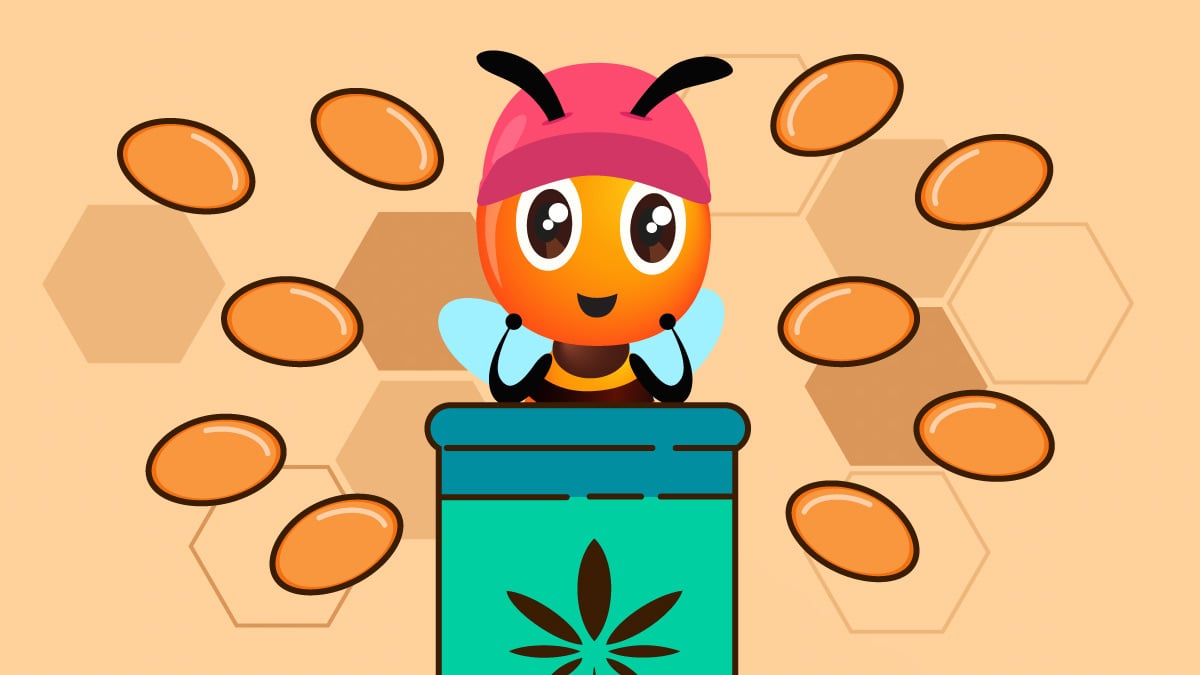Is CBD overdose a real thing? This article explains the possible consequences of taking large amounts of CBD.
Emergency room visits caused by THC overdoses aren’t uncommon. People who take THC in doses that surpass their tolerance and sensitivity threshold may experience unpleasant side effects, from paranoia to increased heartbeat to a drop in blood sugar levels.
Greening out from THC-rich cannabis is totally possible — although a fatal overdose isn’t — but does the same apply to CBD?
Can you overdose on CBD oil?
What happens if you take too much CBD at a time?
Let’s find out!
Can You Overdose on CBD?
Before we elaborate on CBD and overdoses, let’s define the meaning of “overdose.” The term “overdose” can mean a few different things. Some types of overdose are more severe than others, like taking a potentially lethal amount of a drug; other times, it just means accidentally taking a higher dose than planned, or when a person’s body experiences adverse reactions.
A lethal overdose won’t happen with CBD oil because there are no cannabinoid receptors in the brain stem area responsible for respiratory function (1). However, that doesn’t mean you can’t go overboard with cannabidiol.
Here’s what we know so far about overdosing on CBD.
Can Humans Overdose on CBD?
To date, no study has reported an overdose on CBD oil. However, it is possible to accidentally take too much CBD than recommended and experience some mild side effects. For this reason, Gold Bee CBD oils come with graduated droppers that make it easy to measure the proper amount of CBD. What we mean by “too much CBD” is the amount that goes beyond your therapeutic dose and causes discomfort.
There is no universal “overdose threshold” for every individual; the factors involved in determining your proper dosage of CBD include age, sex, diet, weight, metabolism, and previous experience with CBD.
Can Pets Overdose on CBD?

Again, no reports in the United States have covered information about pets being injured by overdosing on CBD oil. Pets respond to CBD oil in much the same way as humans. Pet parents just have to be more cautious about the dosage for their pet’s weight, as even the largest pets are three times smaller than humans.
Pets that use full-spectrum CBD may find significant health benefits in hemp compounds. These products also contain a trace amount of THC (below 0.3%), which isn’t enough to get your pet high — but it’s enough to make full-spectrum extracts more effective than CBD isolate.
If you’re not sure where to start with your pet and CBD oil, we encourage you to find a holistic veterinarian near you. Also, steer clear of large marketplaces like Amazon if you’re shopping for CBD for the first time. Places like this only sell hemp seed oil, mislabeling these products as “hemp oil” or “hemp extract,” which is true from the linguistic point of view, but not from the customer experience perspective.
What Are the Side Effects of Taking Too Much CBD?
CBD is generally well-tolerated in pets and humans. Studies looking at the efficacy and safety of CBD have concluded that CBD doesn’t cause severe side effects at repeated doses of 1,500 mg (2). Most people don’t take more than 50 mg of CBD daily, so it’s difficult to imagine how much CBD you’d need to take in order to experience any unpleasant side effects.
Speaking of which, possible adverse reactions to extreme doses of CBD include:
- Dry mouth
- Dizziness
- Diarrhea
- Changes in appetite
- Potential CBD-drug interactions
The dry mouth effect is uniform among all cannabinoids; it results from their interaction with the cannabinoid receptors located in the salivary glands. When you take a cannabis product, the cannabinoids will bind to these receptors, inhibiting the secretion of saliva. It’s a good idea to stay hydrated before and after taking CBD oil, capsules, or gummies.
When you overdose on CBD, it can cause you to feel dizzy due to a temporary drop in blood pressure. People often report feeling sleepy after taking too much CBD oil; for some, it may be the desired effect, but for others, it can make them want to take a nap during the day.
Changes in appetite aren’t as common as the two above, and researchers are yet to determine the reason why some users experience a boost in appetite, while others report feeling less hunger after taking CBD oil.
Diarrhea may occur as the side effect of consuming too much of the carrier oil in which the CBD extract has been suspended.
Finally, there are CBD-induced drug interactions that users should be aware of, especially those who take any medications. CBD is known to compromise the liver’s ability to metabolize pharmaceutical compounds. It works in a similar way to grapefruit juice, so if your medication has a grapefruit warning on it, you shouldn’t take at the same time you take CBD oil. Again, we suggest that you consult a doctor to avoid these interactions.
How Much CBD Is Too Much?

As mentioned, there aren’t many studies done on the toxicity of CBD. That would be difficult to test from an ethics standpoint. However, a 2011 study published in Current Drug Safety, established the “toxic” dose of CBD at around 20,000 mg of CBD, taken almost all at once (3).
In other words, you’d need to swallow approximately 300 ml of CBD oil that contains 2000 mg per bottle. This translates into 10 full bottles of full-spectrum CBD oil. To understand this, it’s important to remember that the suggested starting dose for most users is somewhere between 5–20 mg per day. While studies have tested dosages up to 1500 mg per day, most CBD oils contain between 100 and 2500 mg in an entire bottle.
When taken at recommended doses, or even above the suggested daily serving, the average user doesn’t have to worry about a CBD overdose.
Effective CBD Dosage for People
Okay, so you can’t fatally overdose on CBD, and probably won’t experience any side effects when you take it in normal doses — but what is the best dosage for daily use? Does it matter if you take CBD with food or on an empty stomach? Is there anything else that can affect the way CBD makes you feel?
For now, CBD isn’t regulated by the FDA. The agency has yet to analyze the efficacy and safety of hemp-derived products, so for the time being, there are no official dosage guidelines.
That being said, many brands provide their own recommendations based on a single serving of their products. When you take our CBD oil for the first time, we recommend starting out with half the dropper of our formula. Our products are designed to provide 40 mg of CBD per milliliter, so the said amount should be enough, to begin with.
According to different studies and experts, it’s best to take 2–5 mg of CBD for every 10 pounds of body weight. Be sure to monitor the effects and write down how you feel after each dose. Doing so will help you minimize the amount of trial and error on your way to finding the best dose of CBD.
Can CBD Make Me Sick?
Pure CBD oil sourced from organic hemp and extracted without aggressive solvents shouldn’t make you sick. CBD is known to reduce physical discomfort, but no studies have found that it can cause one. If you feel sick after taking CBD oil, this could be due to the presence of unwanted additives or contaminants in your product.
You can take the following steps to ensure you’re getting a high-quality product:
- Choose CBD oils made from organic hemp
- Make sure the oil is extracted with CO2 (or alcohol)
- Read third-party lab reports
- Check the company’s reputation before buying
Third-party lab reports are particularly important for determining the quality of a CBD product, as they analyze its potency, chemical makeup, and look for potentially dangerous ingredients. This is the only way to verify the credibility of your supplier in this unregulated market.
Is CBD Oil Addictive?
Studies haven’t found a positive correlation between the use of CBD and addiction. CBD doesn’t have abuse and dependence potential. Research also shows that CBD is a non-intoxicant, meaning it can’t produce the euphoric high associated with high-THC cannabis strains, which further lowers the chance of forming negative habits around it.
In fact, preclinical studies indicate that CBD is a promising compound for targeting withdrawal symptoms in cocaine, alcohol, and opiate users. However, more research is needed to determine the efficacy of CBD oil on large population samples (4).
Can You Build a Tolerance to CBD?

When you develop a tolerance for a particular substance, it means that your body gets used to the compound, which requires you to increase the dose if you want to achieve the same effects — like needing an extra cup of coffee to boost energy. This could cause you to take more of it to get the same feeling, resulting in unwanted effects from CBD overdose.
According to some anecdotal evidence, CBD may have less of an effect on the user as it did previously, or it may take longer to work. Although these could be the indicators of tolerance, other factors are at play too. The issue of inconsistency in the effects could be caused by different times of the day or the changing sensitivity of your cannabinoid receptors.
The latter is especially true for long-term marijuana users who supplement CBD. Since they have been previously introduced to cannabinoids, this experience can change how hemp-derived products work for them.
As a matter of fact, the cannabinoid receptors may become desensitized after prolonged use of THC, which may change the way CBD makes you feel — especially if you’re looking for the effects that are dependent on the cannabinoid receptor pathways.
If you use CBD isolate, switching to broad-spectrum or full-spectrum CBD may prove effective. Whole-plant extracts contain other cannabinoids, terpenes, and trace amounts of THC, all of which influence the effectiveness of CBD. Full-spectrum CBD creates entourage effects, where all the cannabis compounds work synergistically to amplify their health benefits. Isolates do not evoke this effect.
Final Thoughts on CBD Overdose
The bottom line is this: CBD, even in very high doses, is safe. Like anything, if ingested in extreme amounts, it could have negative side effects, although they are pale in comparison to other substances, even the more potent cannabinoids. The good news is that you can’t fatally overdose on CBD, and in order to reach a toxic dose, you’d need to drink 10 bottles of highly-potent CBD oil in a row — which isn’t possible under normal conditions.
However, if you want to achieve optimal results with CBD and avoid any unwanted reactions, we recommend that you start low and go slow, gradually increasing the initial dose until you reach the point where you experience desired effects.
Always make sure to purchase your CBD products from trustworthy suppliers who can prove the quality of their products with batch-specific certificates of analysis from third-party laboratories.
References:
- National Cancer Institute. “Cannabis and Cannabinoids (PDQ) – Health Professional Version.
- Iffland, Kerstin, and Franjo Grotenhermen. “An Update on Safety and Side Effects of Cannabidiol: A Review of Clinical Data and Relevant Animal Studies.” Cannabis and cannabinoid research vol. 2,1 139-154. 1 Jun. 2017, doi:10.1089/can.2016.0034
- Iffland, Kerstin, and Franjo Grotenhermen, Op. Cit.
- Prud’homme, Mélissa et al. “Cannabidiol as an Intervention for Addictive Behaviors: A Systematic Review of the Evidence.” Substance abuse: research and treatment vol. 9 33-8. 21 May. 2015, doi:10.4137/SART.S25081

